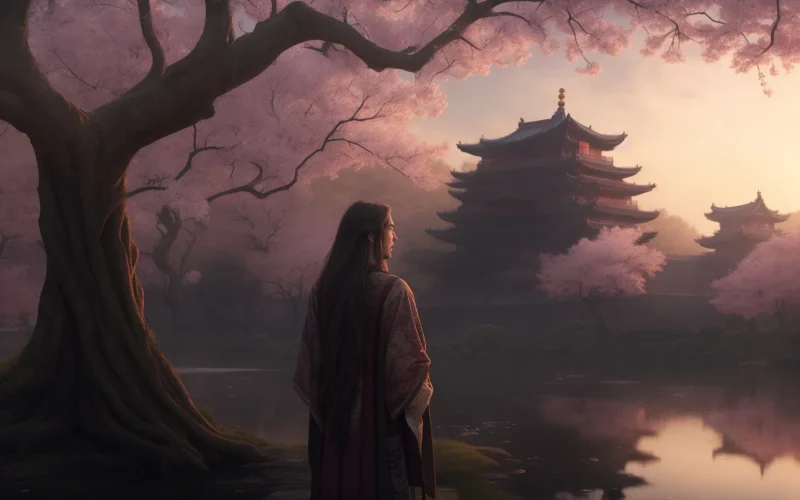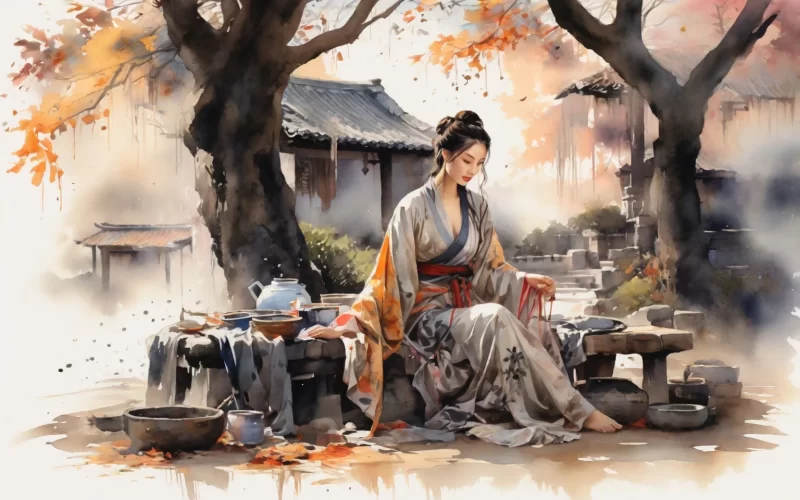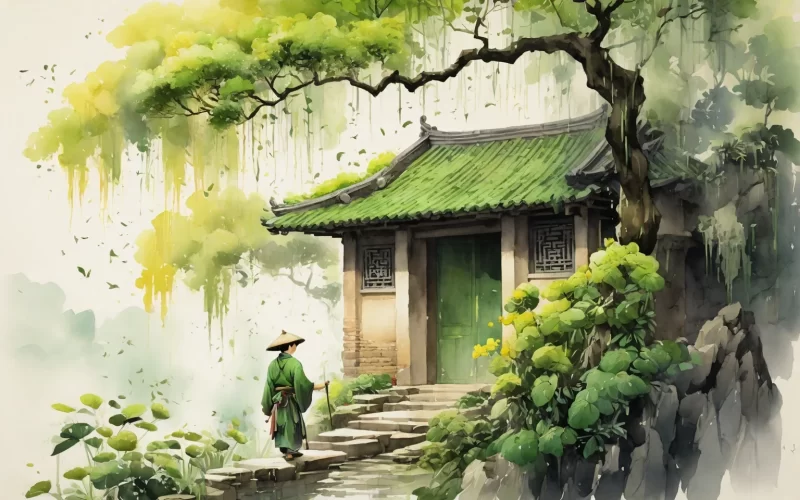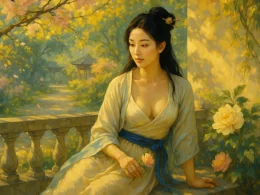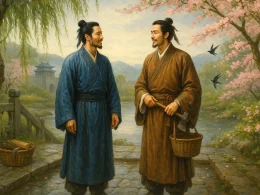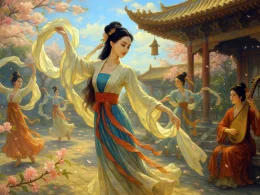Finches flash yellow through the Imperial Grove Of the Forbidden City, pale with spring dawn; Flowers muffle a bell in the Palace of Bliss And rain has deepened the Dragon Lake willows; But spring is no help to a man bewildered, Who would be like a cloud upholding the Light of Heaven, Yet whose poems, ten years refused, are shaming These white hairs held by the petalled pin.
Original Poem
《赠阙下裴舍人》
二月黄莺飞上林,春城紫禁晓阴阴。
长乐钟声花外尽,龙池柳色雨中深。
阳和不散穷途恨,霄汉长怀捧日心。
献赋十年犹未遇,羞将白发对华簪。
Interpretation
Composed during Qian Qi's early years in Chang'an while seeking official advancement, this poem was presented to the influential court official Pei Sheren in hopes of gaining recognition and recommendation. The title's "Quexia" (below palace gates) symbolizes the imperial court, while "Pei Sheren" refers to a then-senior secretary in the Central Secretariat. Though historical records of this figure are scarce, the poet regarded him as a prestigious potential patron. The work subtly expresses Qian Qi's frustration with unrecognized talent and his yearning for appreciation.
First Couplet: "二月黄莺飞上林,春城紫禁晓阴阴。"
Èr yuè huáng yīng fēi shàng lín, chūn chéng zǐ jìn xiǎo yīn yīn.
"Golden orioles flit through Shanglin's February air; Spring veils the Purple Forbidden in dawn's misty lair."
The opening palace spring scene ostensibly depicts scenery but actually underscores Pei's exalted status through imperial garden imagery, establishing the emotional tone.
Second Couplet: "长乐钟声花外尽,龙池柳色雨中深。"
Cháng lè zhōng shēng huā wài jìn, lóng chí liǔ sè yǔ zhōng shēn.
"Changlegong bells fade beyond blossoms' sway; Dragon Pond willows deepen in rain's gray."
These rainy palace vistas showcase elegant surroundings while implying the poet's distance from power. The interplay of bell tones and willow hues conveys both beauty and separation.
Third Couplet: "阳和不散穷途恨,霄汉长怀捧日心。"
Yáng hé bù sàn qióng tú hèn, xiāo hàn cháng huái pěng rì xīn.
"Spring's warmth won't melt my thwarted path's cold pain; Yet toward celestial heights my sunward heart remains."
Confessing unwavering loyalty despite adversity, the poet employs classical allusions ("sunward heart" suggesting devotion to the emperor) with profound sincerity.
Fourth Couplet: "献赋十年犹未遇,羞将白发对华簪。"
Xiàn fù shí nián yóu wèi yù, xiū jiāng bái fà duì huá zān.
"Ten years of verse offerings brought no grace; White-haired before your jeweled pins, shame I face."
The poignant conclusion contrasts the poet's decade of frustration with the recipient's high status, blending dejection with subtle appeal for patronage.
Holistic Appreciation
The poem progresses from spring scenes to personal melancholy through artful contrasts. The initial quatrain's imagery—Shanglin Park orioles, Forbidden City mist, Changlegong bells, Dragon Pond willows—creates a rarefied court atmosphere that simultaneously highlights Pei's privileged position and the poet's exclusion. The latter quatrain's pivot to personal struggle ("sunward heart," "white-haired shame") reveals layered emotions: persistent loyalty beneath career disappointment. Particularly moving is the final line's self-conscious aging before power's splendor—a masterstroke of restrained pathos.
Artistic Merits
- Scenic Symbolism: Imperial gardens mirror desired bureaucratic realms
- Emotional Architecture: Progresses from objective description to subjective lament
- Allusive Depth: "Sunward heart" derives from classical ministerial devotion tropes
- Diction Control: Maintains dignified restraint despite personal anguish
Insights
This poem illuminates the Tang scholarly paradox: brilliant minds often languished without patronage. Qian Qi's ten-year struggle ("verse offerings") and ultimate "white-haired shame" reflect systemic barriers to meritocracy. Yet his enduring "sunward" commitment offers timeless inspiration—how to sustain professional hope amid repeated setbacks. Modern readers might ponder: When does respectful persistence become fruitless self-abasement? The poem's delicate balance between self-respect and necessary flattery remains profoundly relevant.
Poem translator
Kiang Kanghu
Qian Qi (钱起, 722-780 A.D.)was a poet of the Tang Dynasty, Han nationality, and a native of Wuxing (now Huzhou City, Zhejiang Province), who was one of the “Ten Talents of the Dali” and the “Champion of the Ten Talents of the Dali”. In his early years, he was unsuccessful in several examinations, but finally he was admitted as a scholar in 751 AD.






